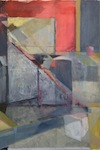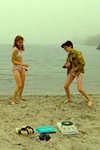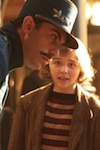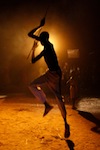Courage isn’t always forceful or strong. On the first day of my teaching career, some thirty odd years ago, my sweet husband gave me an art piece for my classroom with a quote from Mary Anne Radmacher that says: “Courage doesn’t always roar. Sometimes courage is that little voice at the end of the day that says I’ll try again tomorrow.” That’s me in a nutshell. And that’s the beauty of the thing. Because so far, I still have another tomorrow.
All in Stage & Screen
When a Dream Becomes a Life
Vocations are not occupations, though they are integrally woven together. To know the difference and the difference it makes is critical, and much of the grief we experience is borne of missing one for the other. Vocation is always the longer, deeper story of someone’s life; for Joy, she was always the creative creator of things she would make that the whole world would someday enjoy. Occupation is not that, but is more the way we describe the things we do along the way of life, entering into particular responsibilities and relationships that are ours, and while shaping and forming us, are more often than not signposts of the deeper vocation. They are not the point; they point to the point.
 Language distinguishes us, but it’s still just empty space. Space I can see but not touch, and that’s not enough. I need to hold onto a meaning with texture, with a sharpness that cuts into my hands, gets in my blood.
Language distinguishes us, but it’s still just empty space. Space I can see but not touch, and that’s not enough. I need to hold onto a meaning with texture, with a sharpness that cuts into my hands, gets in my blood.
If this is so important, why don’t I understand it, why isn’t it obvious?
 This is a lonely posture, but letting people in can hurt, bruise, bewilder. Looking into another's eyes and seeing myself there means encountering not just that person and their messes, but my own. It means I have to stare my own presence down and feel that pinch in my chest, that thickness in my throat. I have to face the former me because someone knew me then, knows me now, and if we both stick around, will know me in the future. That is love, and it is tricky.
This is a lonely posture, but letting people in can hurt, bruise, bewilder. Looking into another's eyes and seeing myself there means encountering not just that person and their messes, but my own. It means I have to stare my own presence down and feel that pinch in my chest, that thickness in my throat. I have to face the former me because someone knew me then, knows me now, and if we both stick around, will know me in the future. That is love, and it is tricky.
To know someone else, to love someone else, is to lose myself a little.
 Despite my deep longing to be among the ranks of what I call the “true” artists, the kind who can effortlessly dress themselves in wonderfully whimsical, sophisticated clothing and decorate their homes with lovely abstract art that has deep roots in poetic allusion, I am really too poorly dressed and my home too pathetically decorated to ever count myself among their ranks.
Despite my deep longing to be among the ranks of what I call the “true” artists, the kind who can effortlessly dress themselves in wonderfully whimsical, sophisticated clothing and decorate their homes with lovely abstract art that has deep roots in poetic allusion, I am really too poorly dressed and my home too pathetically decorated to ever count myself among their ranks.Don’t Leave Your Brains at the Box Office
For its two-plus hours, it is wonderfully done: beautifully imagined, well acted, tenderly told, and when it was all over I was pleased. There is no way that the complexity and nuance of the novel could be captured in a film. So the director and the screenwriter are making choices, for good or not, about how to the tell the story in a way that is fair, but is at the same time their own work of art, too. I get that, and I honor that.
But there was a false note.
 “Through beauty,” Fellows surmises, “we are led to a joy which belongs to another world.” Walking out of the theater after viewing Moonrise Kingdom, I carried with me the joy of a determined color story. Anderson’s choice of warm, desaturated colors intensified a feeling of nostalgia for childhood. Every shot is elaborately self-conscious recreating a childhood longing for fantasy worlds. The real genius of Wes Anderson, in my opinion, is his story of color.
“Through beauty,” Fellows surmises, “we are led to a joy which belongs to another world.” Walking out of the theater after viewing Moonrise Kingdom, I carried with me the joy of a determined color story. Anderson’s choice of warm, desaturated colors intensified a feeling of nostalgia for childhood. Every shot is elaborately self-conscious recreating a childhood longing for fantasy worlds. The real genius of Wes Anderson, in my opinion, is his story of color. Toward the end of the movie, I wanted justice. This evil man who was bent on punishing poor, fatherless children must be punished. He deserved the fate that I was sure the movie maker’s had in store for him.
Toward the end of the movie, I wanted justice. This evil man who was bent on punishing poor, fatherless children must be punished. He deserved the fate that I was sure the movie maker’s had in store for him. Inge’s faith gave her the gumption to arrive on strange soil with little more than a possibility of love. She continually forgave a community who would not reciprocate the courtesy. And though she and her beau were shunned in the eyes of the law, they triumphed by having faith in each other. Like any good love story, they found something they needed in the quiet eyes of the other.
Inge’s faith gave her the gumption to arrive on strange soil with little more than a possibility of love. She continually forgave a community who would not reciprocate the courtesy. And though she and her beau were shunned in the eyes of the law, they triumphed by having faith in each other. Like any good love story, they found something they needed in the quiet eyes of the other. You might not understand or connect with those images this year or next year. But we’re not in a hurry; the Spirit’s not in a hurry. And it might be another moment at another time in a different season of life that something about one of those images really begins to mean something to you. It just takes spending time with it.
You might not understand or connect with those images this year or next year. But we’re not in a hurry; the Spirit’s not in a hurry. And it might be another moment at another time in a different season of life that something about one of those images really begins to mean something to you. It just takes spending time with it. Celestin asked if I would help raise awareness. As a photographer/filmmaker, I set out to do just that. It’s difficult to get Americans to think twice about anything unless we are given provocative images. I started off by capturing stills and footage. That gained momentum until I had to start turning down my professional photography jobs and put all my time into making the movie. Clearly, raising awareness is just the beginning.
Celestin asked if I would help raise awareness. As a photographer/filmmaker, I set out to do just that. It’s difficult to get Americans to think twice about anything unless we are given provocative images. I started off by capturing stills and footage. That gained momentum until I had to start turning down my professional photography jobs and put all my time into making the movie. Clearly, raising awareness is just the beginning. As I took my seat in the hushed house, low lights came up on a minimal but rich wall of loosely joined wooden slats that allowed amber rays to seep through jagged cracks. A circle of Roman numerals implied a grand clock in the center of the expanse. As strains of Mozart’s “Requiem in D” began, gentle fog crept in and enveloped us. We passed the next two hours in the company of some of Nashville’s finest acting talents, all dressed in handsome, jeweled hues.
As I took my seat in the hushed house, low lights came up on a minimal but rich wall of loosely joined wooden slats that allowed amber rays to seep through jagged cracks. A circle of Roman numerals implied a grand clock in the center of the expanse. As strains of Mozart’s “Requiem in D” began, gentle fog crept in and enveloped us. We passed the next two hours in the company of some of Nashville’s finest acting talents, all dressed in handsome, jeweled hues.
















